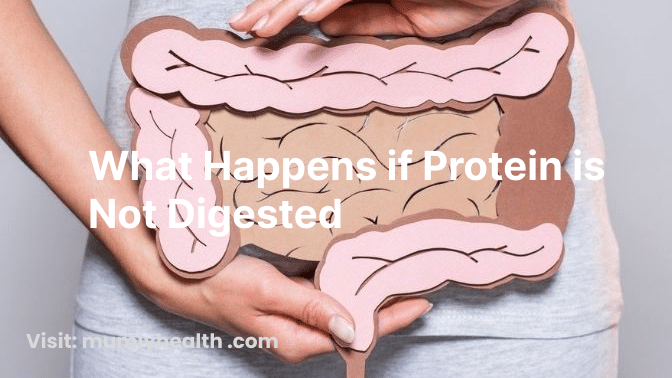We often hear about the importance of a balanced diet that includes proteins, carbohydrates, and fats. Proteins, in particular, play a crucial role in various bodily functions and are considered the building blocks of life.
But have you ever wondered what happens if protein is not digested by our bodies? In this article, we will explore the consequences of inadequate protein digestion and the impact it can have on our overall health and well-being.
The Role of Protein in the Body
Before we delve into the effects of undigested protein, let’s first understand why protein is essential for our bodies. Proteins are made up of amino acids, which are the building blocks that support the growth, repair, and maintenance of our tissues, organs, and muscles. They are involved in numerous vital processes, such as:
- H2: Muscle Growth and Repair: Protein is crucial for the growth and repair of muscles, making it vital for athletes, fitness enthusiasts, and anyone looking to maintain healthy body composition.
- H2: Enzyme Production: Enzymes are proteins that facilitate chemical reactions in our bodies. Without proper protein digestion, the production of enzymes may be compromised, leading to various metabolic imbalances.
- H2: Hormone Regulation: Many hormones, including insulin and growth hormone, are proteins. They help regulate essential processes such as metabolism, blood sugar levels, and tissue growth.
- H2: Immune System Function: Antibodies, which are proteins, are the frontline soldiers of our immune system. They help recognize and neutralize foreign invaders, protecting us from infections and diseases.
The Digestion Process
To better understand the consequences of undigested protein, let’s take a closer look at the digestion process. Digestion begins in the mouth, where saliva helps break down the food we consume. From there, it travels to the stomach, where gastric acid and enzymes work together to further break down the proteins into smaller fragments called peptides.
The small intestine is where the majority of protein digestion takes place. Enzymes released by the pancreas and small intestine break down the peptides into individual amino acids. These amino acids are then absorbed into the bloodstream, where they are transported to different parts of the body to support various functions.
Read also: 7 Products That Are Storming The Hospitality Industry
Effects of Inadequate Protein Digestion
Now, let’s explore what happens when protein is not properly digested:
- H2: Nutrient Malabsorption: Inadequate protein digestion can lead to impaired absorption of essential amino acids in the small intestine. As a result, the body may not receive an adequate supply of amino acids, which are crucial for various bodily functions.
- H2: Nutritional Deficiencies: Insufficient protein digestion can contribute to nutritional deficiencies, particularly in essential amino acids. These deficiencies can hinder the body’s ability to repair and regenerate tissues, leading to muscle wasting, weakened immune system, and delayed wound healing.
- H2: Digestive Discomfort: When proteins are not adequately broken down, they can cause digestive discomfort such as bloating, gas, and stomach cramps. This is often due to the fermentation of undigested proteins by gut bacteria, leading to the production of gas and other byproducts.
- H2: Allergies and Sensitivities: Incomplete protein digestion can increase the risk of developing allergies and food sensitivities. Undigested proteins may trigger an immune response, leading to symptoms such as skin rashes, nasal congestion, digestive upset, and even anaphylaxis in severe cases.
- H2: Increased Toxic Load: If undigested proteins reach the large intestine, they can put additional strain on the gut and liver. The gut bacteria may produce toxins while attempting to break down these proteins, leading to an increased toxic load on the body.
Improving Protein Digestion
Maintaining proper protein digestion is vital for overall health. Here are some tips to enhance protein digestion:
- H2: Chew Thoroughly: Properly chewing your food allows saliva to initiate the breakdown process. This eases the burden on the stomach and small intestine, ensuring efficient digestion.
- H2: Manage Stress: Chronic stress can hinder digestion, including protein digestion. Engage in stress-reducing activities such as meditation, deep breathing exercises, and regular physical activity to support optimal digestion.
- H2: Enzyme Supplements: Consider taking digestive enzyme supplements that contain proteases. These enzymes can assist in breaking down proteins, especially if you have digestive issues or insufficient natural enzyme production.
- H2: Probiotics: Probiotics promote a healthy gut environment by supporting the growth of beneficial bacteria. A balanced gut microbiome contributes to improved protein digestion and overall digestive health.
Conclusion
Protein digestion is a crucial process that allows our bodies to obtain essential amino acids for various bodily functions. Inadequate protein digestion can have significant consequences, including nutrient malabsorption, nutritional deficiencies, digestive discomfort, allergies, and increased toxic load.
By understanding the importance of proper protein digestion and implementing strategies to enhance it, we can optimize our overall health and well-being. Remember to chew your food thoroughly, manage stress, consider enzyme supplements, and support your gut health through the use of probiotics. Take care of your protein digestion, and your body will thank you for it.
